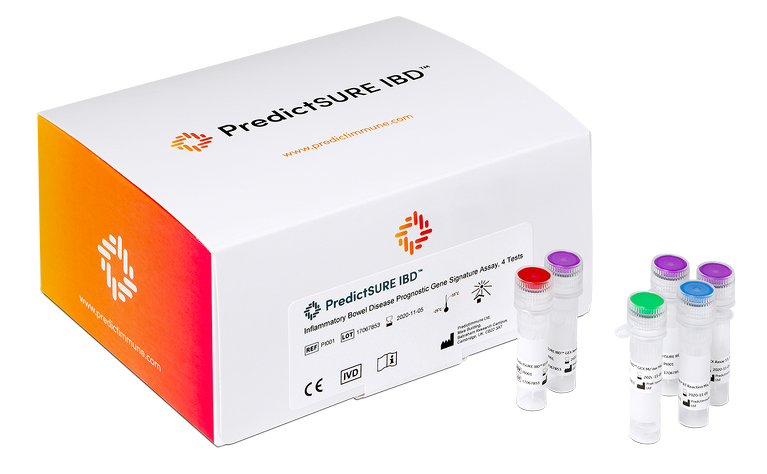Prognostic tests predict the likelihood of something happening, such as how often you will experience flares. Find out more about it in this article.

A prognostic test predicts something, such as your likelihood of developing a disease or likely events happening during the course of that disease. They are different from diagnostic tests, which diagnose specific diseases and conditions.
In respect to inflammatory bowel disease (IBD), prognostic tests predict the likely progress of your disease (your prognosis), such as your likelihood to experience repeated flares or the likelihood you will develop complications. This information could then help to inform the treatment you are given.
Prognostic tests look for certain biomarkers within a patient’s body. Biomarkers are naturally occurring products in your body, such as antibodies, specific genes, patterns of gene expression or other biomarkers that can identify a particular disease or physiological process within an individual.
Each biomarker tells us different things about a person. For example, blood pressure and cholesterol levels are both biomarkers that tell us something about the state of someone’s health. In prognostic tests for Crohn’s disease and ulcerative colitis the biomarkers may help predict future events in your disease. There are a few prognostic tests on the market and they all look for different biomarkers in blood to make predictions about the likelihood of events happening.
This test, made by UK-based PredictImmune, is available in the UK and Europe, but not yet reimbursed in either, meaning you would currently need to pay for it yourself, and predicts the likelihood of a Crohn’s disease or ulcerative colitis patient having relapsing disease (frequent flares). When carrying out the test they are looking at 15 genetic biomarkers in an IBD patient’s blood which are linked to T-cell exhaustion, which is a particular state of the immune system. They have found that people who exhibit T-cell exhaustion have better outcomes in IBD, placing them in a lower risk group for recurrent active disease1.
This test, made by Prometheus Biosciences, is available in the US and focuses on identifying Crohn’s disease patients who are at greater risk of developing complications. The test measures six blood markers and three genetic markers to build up a picture of the patient’s previous Crohn’s disease activity and then make predictions about potential future complications. The company has identified these markers as being able to show a Crohn’s disease patient’s risk of complications.
This US-based test also looks at Crohn’s disease, identifying patients who are at higher risk of bowel damage and surgery. This is both a prognostic test and a diagnostic test, meaning it also helps diagnose people with Crohn’s disease. The test looks for certain antibodies in a patient’s blood, with the more of these antibodies they have the greater their chances of being in a high risk group2.
Prognostic testing is fairly new and not yet widely adopted by IBD teams. In the UK one of the big barriers to adoption is that the tests don’t have approval from the National Institute for Clinical Excellence (NICE) so aren’t available for free on the NHS. If you want a test you currently have to pay for it yourself.
The makers of PredictSURE IBD have submitted evidence to NICE’s Diagnostic Assessment Programme (DAP) to try to get it funded by the NHS. They are expecting a decision in early 2021.
In the US, Prometheus Crohn’s Prognostic and Glycominds IBDX are available to doctors to use, and PredictSURE IBD will be available soon. The tests may not be covered by a patient’s insurer, though. Glycomind IBDX and PredictSURE IBD are also expanding into other countries around the world.

There are still lots of things we don’t know about Crohn’s disease and ulcerative colitis, and this includes the reasons why people flare or develop complications. Just because you are told you are at a high risk of something happening, it doesn’t mean it will. It’s thought factors such as environment, stress, diet and many others may all play a role in our disease course alongside our biochemistry.
With this in mind, it’s difficult to see that any prognostic test will be 100% accurate in predicting how your future with IBD is going to pan out, but they may give us a much better picture than the current methods doctors use to try and predict disease outcomes, such as looking at results from endoscopy and the patient’s profile (such as age, sex, disease type).
In one study PredictSURE IBD was shown ‘to be more effective than existing clinical risk factors at predicting outcomes for Crohn’s and ulcerative colitis patients’3. In the study 98% of those identified as low risk didn’t have multiple flares during a 12 month period, while 91% in the high risk group did. So, 9% who were told they were high risk actually turned out to be low risk in the 12 months after taking the test, while 2% who were told they were low risk turned out to be high risk.
Studies into the efficacy of PredictSURE IBD continue to be carried out with both the PROFILE (UK) and PRECIOUS (US) clinical trials continuing to recruit patient participants.
It’s important to note that prognostic tests would work alongside other tests currently used by your IBD team to help them inform their choices about your treatment, and not necessarily as a replacement for these.
The thought of having a test which predicts future outcomes for your IBD provokes mixed opinions from patients.
A recent survey carried out by IBDrelief in conjunction with PredictImmune found that over 83% of patients who responded agreed or strongly agreed they would take a test that gave a prognosis for the future severity of their disease. However, over 11% said they disagreed or strongly disagreed and would not take the test.
Some of the advantages of prognostic testing may include:
Treatment could be more targeted
Knowing what the likelihood is of having repeated flares or complications from your Crohn’s disease or ulcerative colitis could help with your treatment plan. Currently most patients are treated via a ‘step-up’ approach, where a pyramid of medications are worked through until the right medication is found. If it’s known a patient is more likely to experience regular severe flares of their disease then a medication further up the pyramid may be used earlier.
This could prevent many months, or even years, of trying different treatments that don’t work. This would also allow for treatments to be more personalised to the patient, including considering surgery much earlier for some. One patient who took the survey said: "I have needed an ileostomy for my UC. I’d have had this done much sooner if I’d known that my flares would become worse and more resistant to medication.
Planning of appointments
If your IBD team knows you are predicted to have more complications or flares they can plan more frequent appointments to monitor how you are doing. Conversely, a low risk prognosis means that patients and doctors can be more confident in less frequent, possibly remote monitoring, avoiding unnecessary trips to for hospital appointments.
Take away some uncertainty
One of the biggest challenges with IBD is the uncertainty of not knowing when, or if, you are going to flare. If you know you are in a lower risk group for flares then it may offer some reassurance when planning for future events. In support another patient who took the survey said: "I would find it helpful to have more prognostic tests to help me manage my lifestyle and how it affects my disease progression."
On the flip side, there may be disadvantages to prognostic testing for IBD too. These may include:
Do we really want to know the future?
Would you want to take a test knowing it may tell you that you are at high risk of flares or complications in the future? For some people this is fine, but for others they would rather not know. It could end up being a great source of fear and anxiety for people.
Low risk doesn’t mean no risk
Just because the test tells you that you are at low risk of flares or complications, it doesn’t necessarily mean this will be the case. There’s a lot we don’t know about Crohn’s disease and ulcerative colitis, including the factors that contribute to flares. While the markers measured in the tests may be a good indicator of your risk factors, there may be other things in our lives that contribute to flares which can’t be controlled. And, unfortunately we don’t know enough about what these things may be to mitigate against them.
Fears of receiving less treatment and support
While those placed in high risk groups may receive more support from their IBD teams, there is a fear from patients that those in the lower risk groups for flares and complications may get less. They may receive fewer face-to-face appointments and less frequent monitoring, relying more on the patient to contact their IBD team if there is a change in their symptoms.
However, it’s important to remember that you will still be receiving treatment for your IBD team and will be given ways to contact them should you go into a flare.
There’s no doubt that prognostic testing in IBD holds a lot of potential in better targeting treatments, and these types of tests could certainly hold lots of benefits to help us move towards a model of more personalised medicine and individualised care. However, there are several barriers that may need to be overcome, such as patient confidence, before they become a widely adopted part of IBD care.
References

